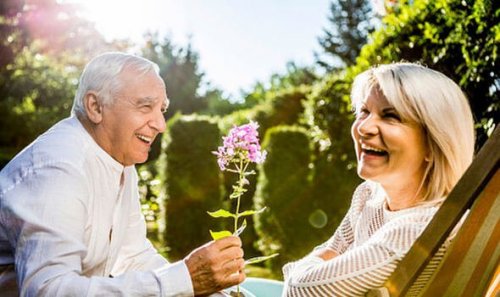5 Myths About Senior Sexuality

Many consider senior sexuality a taboo subject. Society doesn’t talk about it out of shame, fear, or simply ignorance. We praise eternal youth, link sexuality to it, and think it’s exclusively for young people.
Aging doesn’t mean losing interest in sex all of a sudden. Normally, if people are in good health, they remain sexually active throughout their lives. Therefore, once again, the premise is that good health is the key to enjoying sexuality to the fullest.
There are many stereotypes, prejudice, and marginalization regarding senior sexuality. This causes older people to stop talking about it and even eventually stop having sex altogether.
To enjoy sexuality healthily at an advanced age, it’s important to know how the body changes over time. This way, we’ll know how they influence us. Understanding these changes means creating an outlook in which the loss of physical aptitudes does not limit well-being.
In this sense, being aware of the physical changes associated with age and being truly conscious of them is essential to face the myths surrounding the subject of “greater” pleasure. These myths lead to a rejection of sexuality.

Specialists agree that the most important organ in sexuality is the brain. Any fear or insecurity can become the biggest obstacle to maintaining intimate relationships. The main fear in men is usually impotence, not getting an erection or not maintaining it. Meanwhile, women’s fears relate to their physical appearance, like not feeling sexy or sensual enough. It’s true that age causes inexorable changes, but that’s precisely why we must accept them.
The latest gerontology studies signal the importance of changing our false beliefs about sexuality. Here are five of the most widespread myths about senior sexuality.
Men have greater sexual needs than women
One of the most widespread myths about senior sexuality has to do with the belief that men have greater sexual needs than women. Both men and women have sexual needs, regardless of their age.
Aging and sex, except in extreme pathological cases, are good companions. It’s not about trying to have the same sex life as in youth. Instead, it’s about making an effort, improving the couple’s affectionate relationship, and being able to enjoy it.
Sexuality is for young people
It’s not true that people progressively lose interest in sex. Sexual activity usually remains stable and satisfactory. Factors such as physical and mental health could affect sexual capacity over time but almost never determine it.
Sexual activity in older adults is harmful
The reality is that senior sexuality is quite different: sexual activity helps both partners feel better. It’s wonderful for their mental and physical health. The feeling of self-worth and happiness increases their self-esteem as well as their emotional connection with each other.
There are benefits associated with pleasure, such as feeling happy, eliminating pain, and regulating insomnia and depression. Older people can also enjoy a more active immune system as well as improved interpersonal relationships.
Senior citizens don’t need partners
Love has no age, but it’s normal for it to change over the years. In youth, it can be more passionate, while with time it can become more mature and serene. Older people can prioritize other things such as good company. The couple creates an emotional connection by sharing that complicity which leads to feelings of trust and desire.

Sexual impulses disappear with age
Aging does not lead to the death of desire or ceasing sexual activity. It’s true that the body changes and sexual responses tend to slow down. However, the pleasure is the same if the right stimulus is produced.
Sex is great at any age and a good sex life provides self-esteem and pleasure. With this in mind, in most cases, there’s no reason to give up such a great source of well-being. Unfortunately, this is still a taboo subject in our society.
“A comfortable old age is the reward of a well-spent youth.”
-Maurice Chevalier-
This text is provided for informational purposes only and does not replace consultation with a professional. If in doubt, consult your specialist.








